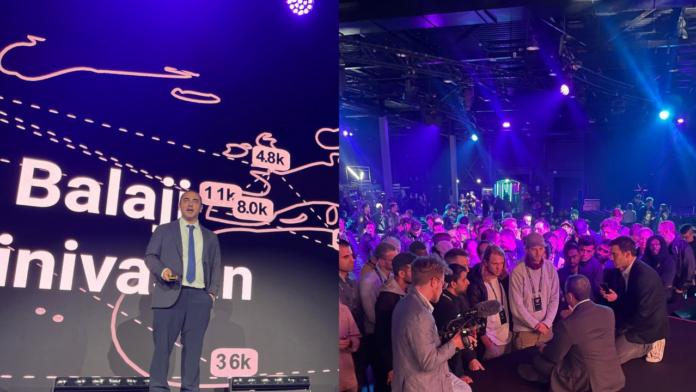The first-ever Network State Conference has successfully wrapped up, boasting more than a thousand in-person attendees and a speaker list that reads like a who’s-who of influential figures in parallel societies, technology, media, and more. Hosted at the Taets Art and Event Park in Amsterdam, the conference opened its doors at 9 am on October 30th, offering a blend of virtual and physical attendance options.
For those who couldn’t make it in person, live streaming was available on YouTube and Twitter, ensuring remote attendees didn’t miss a beat. Those who could make it to the Dutch capital had several transport options, from taxis and ride-share services to a shuttle service from Central Amsterdam. Once they arrived, guests were treated to light breakfast and lunch options, setting a comfortable stage for the day’s discussions.
Balaji Srinivasan, well-known for his ventures in the tech and crypto space, kicked off the event with an opening address. He was followed by an impressive line-up of speakers, each taking the podium to discuss diverse aspects of ‘Parallel Societies’. The list of speakers included big names like Vitalik Buterin, the Winklevoss twins, and Glenn Greenwald, to name a few.
The first part of the conference was focused on ‘Physical Parallel Societies’, featuring talks from experts in building community-centric environments. Alex Grintsvayg from Cabin and Jason Benn from The Neighborhood SF were among those who presented their innovative approaches to creating physical spaces for new types of communities. From nomadic lifestyles to eco-friendly housing, the topics were as varied as they were thought-provoking.
As the day progressed, the conference shifted its focus to ‘Emerging Parallel Societies’. Talks in this section explored the digitisation of community-building, with contributions from figures like Yalor Mewn of Metacartel and Ryan Rzepecki of Spectra. Discussions ranged from the role of blockchain in enabling decentralised communities to the potential for new societal constructs beyond physical borders.
After lunch, the spotlight was on ‘Parallel Institutions’, including media, education, and law. Glenn Greenwald tackled the topic of media, highlighting alternative narratives and platforms. Tyler Cowen of Emergent Ventures discussed parallel trends in education, providing insights into how learning is evolving outside traditional institutions. Garry Tan of YCombinator and Beff Jezos of e/acc delved into parallel legal frameworks that could redefine how societies regulate and govern themselves.
The concluding sessions of the conference centered on ‘Parallel Biomedicine’ and ‘Parallel Finance’, bringing attention to disruptive innovations in healthcare and finance sectors. From the challenges and opportunities in biomedicine discussed by Niklas Anzinger of Infinita to the future of decentralised finance presented by Anatoly Yakovenko of Solana Labs, these talks presented a glimpse into what the future might hold.
As the venue closed at 8 pm, the conversations continued informally, with attendees and speakers alike spending the evening in Amsterdam, undoubtedly discussing the day’s events and brainstorming future collaborations.
The buzz on social media was palpable. GOltra praised the event as “fantastic,” focusing on how Balaji “brings all his citations up onstage,” indicating the depth of research and seriousness that went into the talks. On the other hand, Nazal Kardan had a more sceptical view, claiming that the Network State is mostly a construct of those followed by Balaji on Twitter, potentially narrowing its impact.
Nonetheless, the general sentiment was positive, and there’s no doubt that the Network State Conference has laid down a strong foundation for future dialogues in this fascinating sphere. With discussions that seemed almost straight out of academic journals or Twitter threads, this conference turned abstract ideas into grounded debates and perhaps even potential realities.


